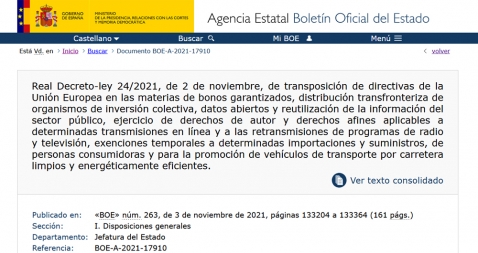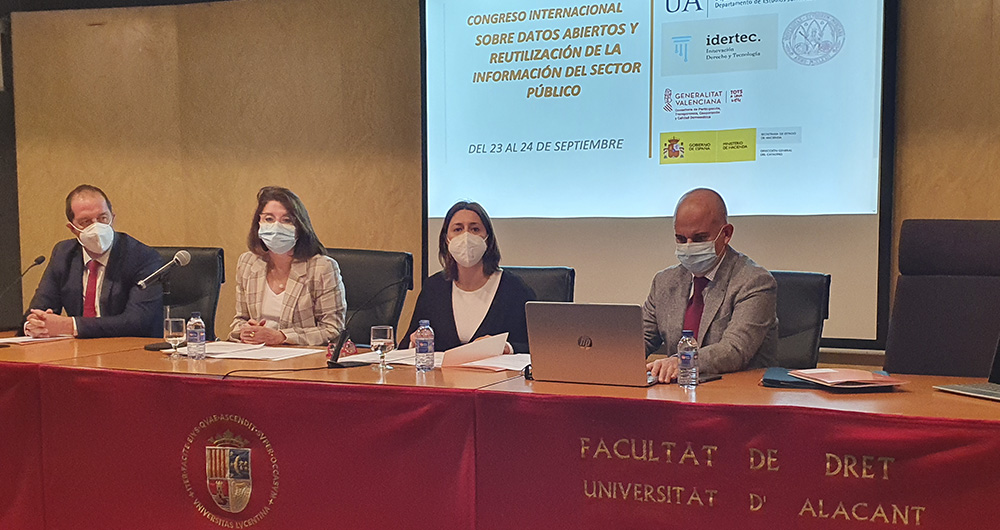Validation of the Royal Decree-Law on reuse of public sector information and open data
Fecha de la noticia: 13-12-2021

Why a Royal Decree-Law?
In the plenary session of the Congress of Deputies held on December 2, 2021, Royal Decree-Law 24/2021, of November 2, on the transposition of several European Union directives, including Directive (EU) 2019/1024 of the European Parliament and of the Council, of June 20, 2019, on open data and the reuse of public sector information, was validated. With this new regulation, the provisions of Law 37/2007, of November 16, on the reuse of public sector information have been modified.
What are the main novelties of this regulation?
The content of the new legal regulation is substantially focused on the incorporation of the provisions of the 2019 Directive to the text of the Spanish Law of 2017, although it is necessary to take into account that those precepts that could be directly applied were already in force since the end of the deadline for its transposition in July 2021. However, apart from updating some already outdated legal references -specifically on personal data protection, public sector legal regime and administrative procedure-, on the occasion of the transposition, some relevant novelties have been added that go beyond the mere adaptation of the European regulation. Thus:
- From the point of view of its subjective scope, the legislation will be applicable to all entities to which, according to the terms provided in their regulatory regulations, the regulations governing the common administrative procedure are applicable. This would be the case, for example, of private law entities linked to or dependent on Public Administrations when they exercise administrative powers.
- The reuse of documents to which access is excluded or limited for reasons of protection of sensitive information on critical infrastructures is expressly excluded from the legal regulation.
- As regards high-value data, alongside those established by the European Commission (i.e. geospatial, Earth observation and environment, meteorology, statistics, companies, as well as mobility), additional datasets may also be specified by the Ministry of Economic Affairs and Digital Transformation, specifically through the selection and updating carried out by the Data Office Division with the collaboration of the stakeholders, both public and private. In this regard it is important to recall that, as a general rule, these data will be freely available, machine-readable, provided through APIs and, where appropriate, provided in the form of bulk download.
- When making high-value data available free of charge could have a substantial impact on the budget of bodies and entities governed by public law that must obtain income to finance their public service activity, the Public Administration to which they are linked, or on which they depend, will be competent to exempt them from this obligation. Consequently, such bodies and entities would not be able to take this decision on their own.
- The scope of the reusable public information catalog is projected -at least potentially- beyond the scope of the General State Administration and its public bodies, so that other entities that decide to create their own catalogs that are interoperable with the national one are required to do so. This is an instrument whose practical relevance is reinforced by the fact that, through it, information will be provided on the rights legally provided for reuse, help systems will be offered and datasets will be made available in accessible, easy to locate and reusable formats.
- En cuanto al sometimiento a las normas legales sobre procedimiento de tramitación de solicitudes de reutilización, las sociedades mercantiles, centros de enseñanza, organismos de investigación o entidades que realicen actividades de investigación quedarán exentos.
- Regarding the submission to the legal rules on the procedure for processing requests for reuse, corporations, educational institutions, research organizations or entities that carry out research activities will be exempted.
- From the organizational point of view, each entity is required to designate a unit responsible for ensuring the availability of its information. Among the functions that will correspond to these units are those related to the coordination of reuse activities with existing policies on publications, administrative information and electronic administration; providing information on which bodies are competent in each area; promoting the updating and making information available in appropriate formats; as well as promoting awareness and training activities.
In any case, in the aforementioned parliamentary session, it was unanimously decided to proceed with the processing of the initiative as a bill through the urgency procedure, one of the possibilities provided for in Article 86 of the Constitution when it comes to validating decree-laws. Consequently, a legislative initiative will have to be processed following the regulatory channels established for this type of cases, which will allow the various parliamentary groups to propose amendments that, if approved, would be incorporated into the final text of the legislation on the reuse of public sector information and open data.
Content prepared by Julián Valero, Professor at the University of Murcia and Coordinator of the Research Group "Innovation, Law and Technology" (iDerTec).
The contents and points of view reflected in this publication are the sole responsibility of its author.














